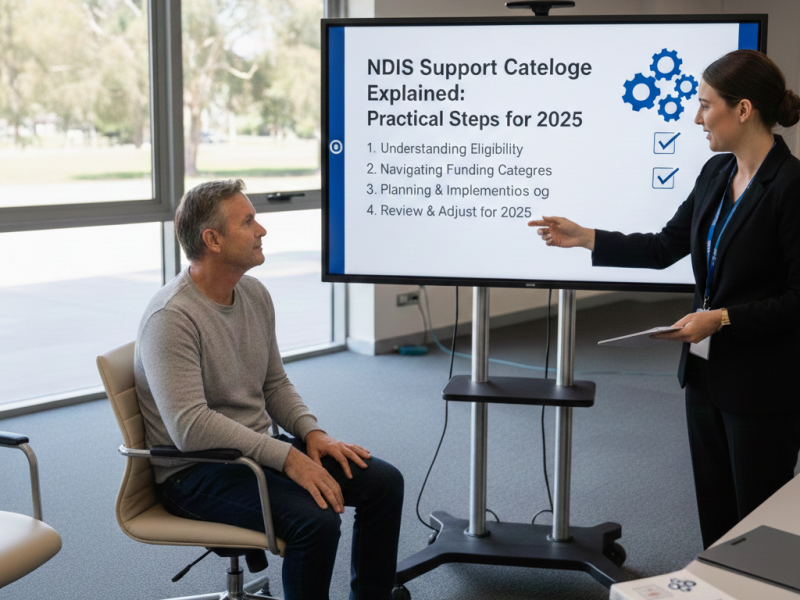The National Disability Insurance Scheme (NDIS) offers funding for essential household cleaning services under the “Assistance with Daily Living” support category. These essential services aim to help Participants maintain a safe, hygienic, and comfortable living environment, particularly when their disability limits their ability to perform daily tasks.They are particularly beneficial for those with limited mobility or ongoing health conditions.
What Do NDIS Cleaning Services Include?
NDIS-funded cleaning services are designed to meet the specific needs of Participants, and may include:
- General House Cleaning: Tasks such as dusting, vacuuming, mopping, and tidying common areas.
- Bathroom and Toilet Cleaning: Sanitising sinks, toilets, showers, and floors to reduce infection risks.
- Kitchen Cleaning: Wiping benches, cleaning appliances, and disinfecting surfaces to maintain food hygiene.
- Laundry Assistance: Washing, drying, folding, and ironing garments, especially beneficial for those with mobility challenges.
- Deep or Seasonal Cleaning: In-depth cleaning of hard-to-reach or frequently overlooked areas to reduce allergens and improve respiratory health.
- Mould Control and Pest Cleaning Support: Services aimed at removing mould and preventing pest infestations, crucial for Participants in damp or poorly ventilated environments.
These services can be provided by both Registered and Unregistered Providers.
Want to Attract More NDIS Clients?
Get expert advice on how to market your services, connect with clients, and grow your practice.
Eligibility Criteria for NDIS Cleaning Services
To access NDIS-funded cleaning services, Participants must demonstrate that the support is reasonable and necessary due to their Disability.
This typically applies to individuals who:
- Have limited mobility or physical impairments
- Experience chronic health conditions affecting their ability to maintain household cleanliness
- Are at increased risk of health complications due to unsanitary living conditions
The inclusion of cleaning services in an NDIS Plan should be discussed with a Plan Manager or Support Coordinator to ensure alignment with the Participant’s goals and needs.
What Do NDIS Cleaners Do?
NDIS-funded cleaning services are tailored to support Participants whose disabilities make it difficult to manage household tasks independently. These services fall under the “Assistance with Daily Living” category and must be directly related to a Participant’s functional limitations. The goal is to create a hygienic and safe home environment that supports health, safety, and dignity.
1. General House Cleaning
Cleaning support typically includes routine domestic tasks such as dusting, vacuuming, sweeping, mopping, and wiping down surfaces. These tasks help maintain a clean and orderly home, particularly for Participants who experience physical, cognitive, or psychosocial barriers that prevent them from managing household upkeep.
2. Bathroom and Toilet Cleaning
Bathrooms require regular sanitation to minimise infection risks. NDIS Cleaners disinfect toilets, showers, sinks, and bathroom floors, which is especially critical for Participants with compromised immune systems, mobility issues, or chronic health conditions.
3. Kitchen Cleaning
Cleaners assist with maintaining kitchen hygiene by wiping benches, cleaning sinks, disinfecting food preparation areas, emptying bins, and cleaning external surfaces of appliances. This helps reduce the risk of food contamination and supports Participants who are unable to manage these tasks due to physical or sensory impairments.
4. Laundry Support
Participants may also receive help with laundry-related tasks such as loading and unloading washing machines, drying clothes, folding, and ironing. This support is vital for those who have difficulty bending, lifting, or operating appliances due to their disability.
5. Deep or Periodic Cleaning
Some NDIS Plans include funding for less frequent, more intensive cleaning. This includes dusting hard-to-reach areas, cleaning ceiling fans, washing windows, and removing build-up in areas not covered by day-to-day cleaning. These services contribute to better respiratory health and overall living standards.
6. Mould Remediation and Pest Control Support
In homes with poor ventilation or water damage, mould and pests can present serious health risks. Some NDIS Cleaners provide specialist services to remove mould or coordinate pest cleaning. These services may be funded if they are considered reasonable and necessary due to the Participant’s disability or vulnerability to environmental hazards.
Becoming an NDIS-Approved Cleaning Provider
To become a Registered NDIS Cleaning Provider, individuals or businesses must:
- Apply for Registration with the NDIS Quality and Safeguards Commission
- Demonstrate compliance with the NDIS Practice Standards, including Worker screening, risk management, and incident reporting capabilities
- Ensure all staff, including any Disability Support Worker, have completed the NDIS Worker Orientation Module and are confident supporting Participants in their home
While NDIS Provider Registration is mandatory for servicing Agency-Managed Participants, Unregistered Providers can offer services to Plan-Managed or Self-Managed clients.
Avaana offers comprehensive NDIS consultancy services to assist Providers with compliance, registration, and operational improvement. Our expertise can guide you through the registration process and help you deliver high-quality cleaning services to all eligible NDIS Participants!
NDIS Cleaner Pay Rates for 2025
The National Disability Insurance Scheme (NDIS) sets maximum hourly rates for cleaning services under the “Assistance with Daily Living” support category. These rates are designed to ensure fair compensation for Providers while delivering value for Participants.
Standard Hourly Rates
As of 1 July 2025, the maximum hourly rates for NDIS-funded cleaning services are:
- National (Metro and Regional Areas): $56.23 per hour*
- Remote Areas: $78.72 per hour*
- Very Remote Areas: $84.35 per hour*
*The above rates are subject to change and were accurate at the time of this article’s publication. Providers should always review the latest version of the NDIS Pricing Arrangements and Price Limits document for accurate guidance.
Group Services
In shared living arrangements, cleaning services can be delivered to multiple Participants simultaneously. The cost should be apportioned fairly among Participants, and this arrangement must be clearly documented in the Service Agreement.
Additional Charges
Equipment and Supplies: Most NDIS Cleaners provide their own equipment and cleaning materials. However, if specific, disability-friendly items are required, additional charges may apply. These should be discussed and agreed upon in the Service Agreement.
Cancellation Charges:
If a Participant cancels a scheduled service with less than two clear business days’ notice, Providers may charge a cancellation fee, as outlined in the NDIS Pricing Arrangements and Services Agreements.
Referrals Start With Reputation – We’ll Help You Build Both
From networking tips to service refinement, we guide NDIS providers toward lasting impact.
Invoicing and Taxation for NDIS Cleaning Services
NDIS providers must issue detailed invoices that comply with NDIS billing standards. Each invoice should include:
- Provider’s NDIS business name and ABN
- Participant’s name and NDIS number
- Date and time of service delivery
- Description of tasks performed
- Hourly rate and total hours worked
- GST component, if applicable (most NDIS services are GST-free)
- Total amount payable
Accurate invoicing ensures timely reimbursement, particularly for agency-managed participants. Providers are encouraged to maintain proper records and may benefit from using accounting software to manage invoices, Business Activity Statements (BAS), and payroll.
Conclusion
Cleaning services funded through the NDIS play a vital role in supporting the health, independence, and dignity of Participants living with disability. Whether it involves routine domestic cleaning or more intensive deep cleaning, these supports help reduce physical strain and environmental health risks, enabling Participants to live safely and comfortably in their own homes.
The NDIS offers clear pricing structures and guidelines to ensure fairness for both Participants and Providers. For Providers, delivering cleaning services under the NDIS not only offers a reliable income opportunity but also provides the rewarding experience of making a meaningful difference in people’s lives.
Understanding the pricing arrangements, eligibility criteria, and invoicing requirements is essential—especially for those new to the NDIS or looking to expand their services. While only Registered Providers can work with Agency-Managed Participants, Unregistered Providers may offer services to Self-Managed or Plan-Managed clients, provided they meet the necessary quality and compliance standards.
If you are a cleaning Provider, seeking to become NDIS-Registered or aiming to better navigate the operational demands of service delivery, Avaana can help. Our experienced consultants support Providers with NDIS Registration, compliance, and business improvement strategies to ensure you deliver high-quality, compliant support to your clients.
FAQs
1. What does NDIS-funded cleaning support include?
NDIS-funded cleaning support can include tasks such as vacuuming, mopping, dusting, cleaning kitchens and bathrooms, doing laundry, and deep or periodic cleaning. In some cases, support may also extend to mould or pest-related cleaning if it is deemed reasonable and necessary in relation to the Participant’s disability. All cleaning supports must directly assist with daily living and be linked to the Participant’s functional limitations.
2. How do I know if cleaning is included in my NDIS Plan?
Cleaning support is typically funded under the “Core Supports” budget, specifically within the category of “Assistance with Daily Living.” If your disability impacts your ability to maintain a clean and hygienic home environment, cleaning services may be included. You can confirm this by reviewing your NDIS Plan or consulting your Support Coordinator or Plan Manager.
3. Can other household tasks be covered by NDIS funding?
Yes. If household tasks such as dishwashing, bed-making, or laundry are necessary due to the Participant’s disability and contribute to safer and more independent living, they may be included. These supports must be documented in the Participant’s Plan and justified as reasonable and necessary.
4. How should Providers invoice for NDIS cleaning services?
Invoices must meet NDIS invoicing requirements and include:
- The Provider’s business details and ABN
- The Participant’s name and NDIS number
- Date and time of service delivery
- Description of the cleaning tasks performed
- Duration and hourly rate
- GST component (if applicable)
- Total payable amount
Timely, accurate invoicing is essential to avoid payment delays, especially for Agency-Managed Participants.
5. Do NDIS Cleaners supply their own equipment?
Most NDIS Cleaners bring their own equipment and cleaning products. However, if specific items are required (such as non-toxic, hypoallergenic, or disability-specific supplies), these should be discussed in advance and included in the Service Agreement. Additional charges may apply depending on the needs of the Participant.


